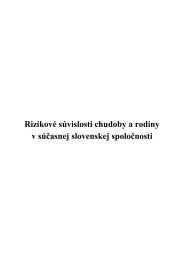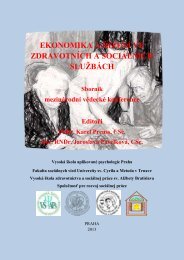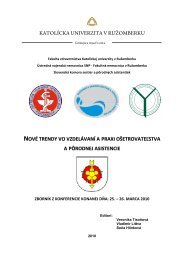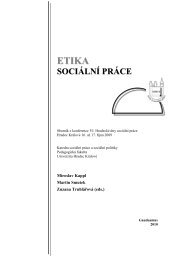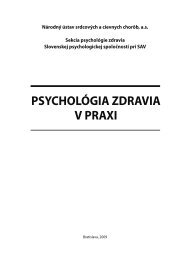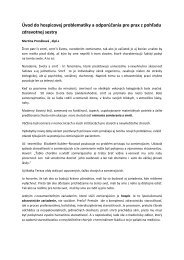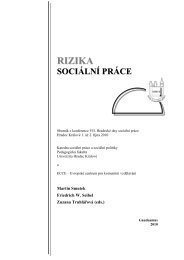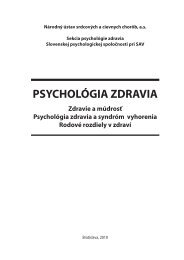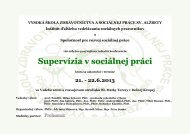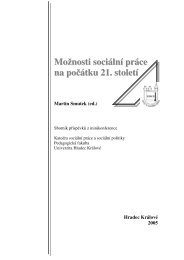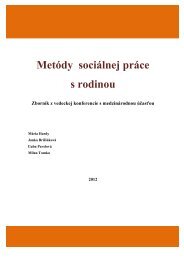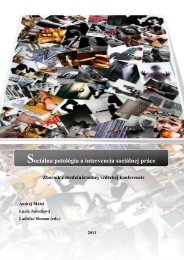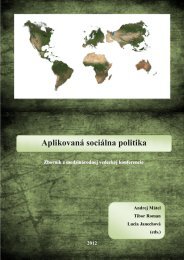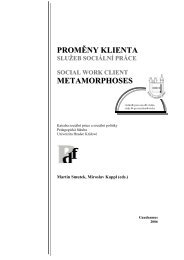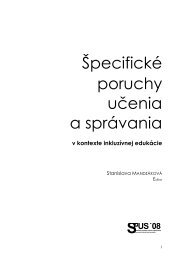Zmena klÃmy â možný dopad (nielen) na obyvateľstvo - Prohuman
Zmena klÃmy â možný dopad (nielen) na obyvateľstvo - Prohuman
Zmena klÃmy â možný dopad (nielen) na obyvateľstvo - Prohuman
You also want an ePaper? Increase the reach of your titles
YUMPU automatically turns print PDFs into web optimized ePapers that Google loves.
in terms of animals and games for example, provides more in-depth exploration<br />
of the context in which the story is set, it could result in the exoticisation of Kenya.<br />
Participant educators were divided on whether or not experiences of poverty in<br />
Kenya should be explored with the children. One participant educator stated, “the<br />
book was so happy and colourful. I didn’t want to then talk about poverty, I didn’t<br />
want to upset them.” (Teacher: Junior Infant class)<br />
Another educator on the other hand, provided information on Kenya which<br />
emphasised the poverty experienced in the country. The quote below was representative<br />
of much of the pupils’ work submitted by this participant. “In Kenya<br />
some people are very poor. They have to build their school. They even have to<br />
clean their school. They have to walk miles to get there. The Kids are smart.” (Pupil,<br />
Senior Infant class).<br />
Overall, the work suggests an essentialist view of poverty in Kenya and raises<br />
concerns about reinforcing stereotypes. It calls for reflection on how to problematise<br />
and complexify children’s growing impressions of Kenya.<br />
Results of Phase Three<br />
The participant educators involved with the third phase of the project were introduced<br />
to the draft programme and asked to report on their experience of using<br />
the programme in their early childhood educatio<strong>na</strong>l setting. An a<strong>na</strong>ylsis of the focus<br />
group meetings, the structured diaries and the pupil work provided, suggests<br />
that participant educators had each used the programme differently, responding<br />
to the individual needs and experiences of their children. It further suggested that<br />
in general children had connected with the story, the characters and with Kenya<br />
and had been encouraged to think more critically about concepts such as race,<br />
fairness and similarities and differences between lifestyles.<br />
• Different Responses to the Draft Programme<br />
The draft education programme provided to all participant educators did not<br />
distinguish between different educatio<strong>na</strong>l settings, for example between primary<br />
school classes and pre-school educatio<strong>na</strong>l settings. As was encouraged and<br />
expected, the participating educators approached the materials differently and<br />
adapted the materials to suit their contexts. From the data provided, the majority<br />
of educators appeared to have delivered most of the learning experiences included<br />
in the programme in a way which tested the methodology developed and met<br />
with the key learning objectives. For example the programme suggested building<br />
an understanding of the location of Kenya by using a poem which travelled the<br />
landscapes between Ireland and Kenya. One educator in a multigrade primary<br />
175



